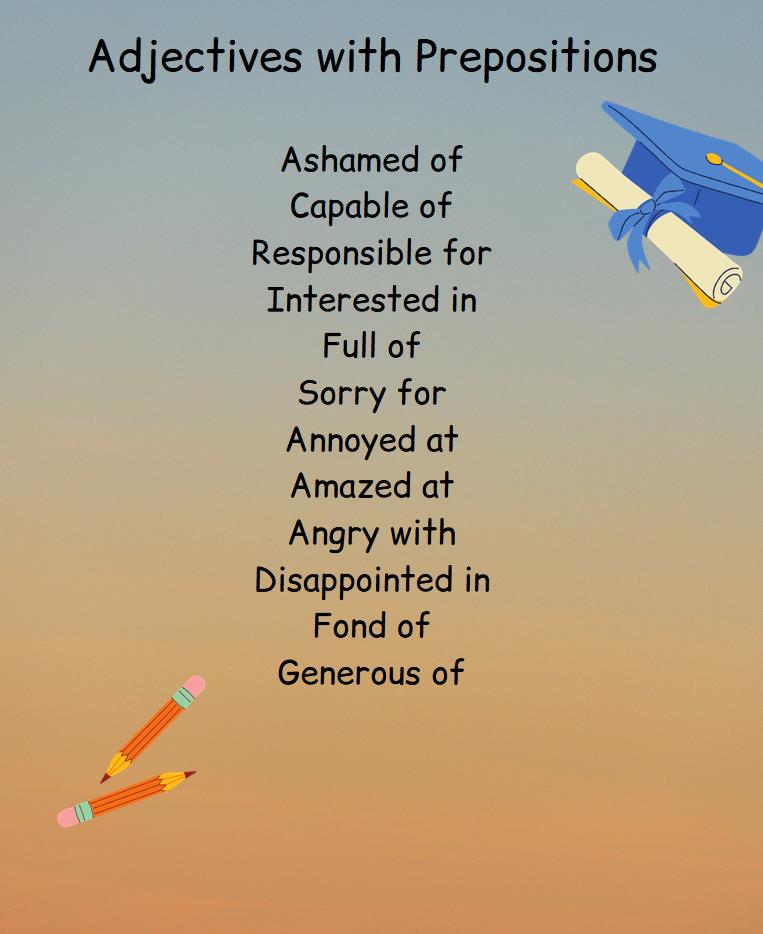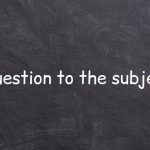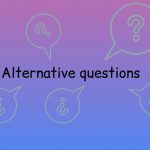There is one interesting category of prepositions in English called Fixed Prepositions (Prepositions after verbs and adjectives or Postpositions).
Remember to read How to learn English with audiobooks for FREE
Common, usual prepositions serve to form a connection between nouns, adjectives, pronouns, and gerunds. Fixed prepositions serve a different role. Fixed prepositions are an important part of the formation of fixed expressions.
Fixed prepositions form special expressions in which words can take on new meanings.
You need to learn such expressions separately because they can mean completely different from what the words of which these expressions are composed mean.
Fixed prepositions play an important role in such expressions. They change the meaning of the word that comes before the preposition.
This is best understood through examples. Let’s take a look at the verb:
Look
This is a simple verb, we all know very well what this verb means. But if we put the preposition after after this verb, then the meaning of the verb will change:
Look after
Look + after means to take care of someone or help someone.
John looks after his elderly parents.
This example means that John cares, helps his parents because his parents are old and they need John’s help.
If we add another proposition to the verb look, for example, the preposition for, then it means “search, seek” for something.
Jessy is looking for a new job.
The verb look and the preposition for in this example mean that Jessy is searching or seeking a new job.
Now let’s add the preposition down to the word look.
Max looks down at his friends.
In this sentence, the verb look and the preposition down mean that Max is disrespectful to his friends. Max thinks he’s better than his friends are.
Look at some more examples of the verb look with different prepositions:
- Look forward to
- Look at
- Look back
We look forward to your lecture with eager anticipation.
I look forward to your reply.
Look at that boat dancing on the waves.
Look at yourself in the mirror.
Adults often look back on their childhood as a golden age.
She can look back on her career with great satisfaction.
Once he makes a plan, he’ll never look back.
The prepositions after verbs changed the original meaning of look by creating new combinations and new meanings.
Why do we need this? Using prepositions after verbs in this way, we make our speech more varied and rich.
Let’s take a look at other verbs and fixed prepositions after these verbs.

Wait for
The verb wait is one of those verbs after which we must use a preposition. After the verb wait we use the fixed preposition for.
Wait for.
Could you wait for me, please?
You must wait for five more days.
Wait for it! I haven’t said ‘go’ yet.
We had a long wait for the train.
Please wait for me downstairs in reception.
Depend on
Now let’s look at the verb depend that combined with the preposition on, forms a very popular combination Depend on.
We use Depend on when we want to express that something depends (relies) on something else.
It can be one result that depends on another result or action that depends on another action.
I don’t know if I can buy myself a new car. It depends on how much money I make this year.
Whether Jessica and I get married depends on the decision of her parents.
My new project depends on my Boss.
Mom said she would buy me a new phone, but it depends on my behavior.
My future depends on how well I do my exams.
Comment on
Another combination that we often use in English is the verb Comment and the preposition on. Comment on.
Take a look at the examples to see how we use this phrase.
The minister refused to comment on individual cases.
The band declined to comment on the story.
I won’t comment on what people say.
Doctors are hesitant to comment on the new treatment.
I’d just like to comment on what your previous caller was saying.
Belong to
The verb belong is another verb after which we always use the preposition to. Belong to.
They belong to the country club.
Does this house belong to Mr. Johnson?
That doesn’t belong to you.
This house must belong to John.
Lions belong to the cat family.
Go to
Another combination is the verb go + the preposition to.
Never go to bed on an argument.
They go to church on Sundays.
The boys go to school in groups.
Now I shall go to sleep. Good night.
Let’s go to that new pizza place tonight.
I go to work by bicycle.
Let’s go to the pub for a drink.
Listen to
The verb listen is another verb after which you should always use the preposition to.
A common mistake is associated with this verb. Many beginners in English use the verb listen incorrectly:
I like listen music.
There is an error in this sentence because the preposition to after the verb listen is a must to use!
I like listen to music.
Never forget: We always use preposition to after the verb listen.
Stop messing about and listen to me.
You’re a powerful man! People will listen to you.
Children should listen to their parents.
Listen to the counsel of your elders.
What kind of music do you listen to?

Certain Verbs and Prepositions On and Off
In English, there are certain verbs after which we must use one of the following prepositions (fixed prepositions).
- on
- off
These are verbs such as:
- Switch
- Put
- Take
Now let’s look at these verbs and prepositions along with examples.
Switch on.
He didn’t bother to switch on the light.
Could you switch on the radio?
Put on.
I put on some nice soothing music.
He put on his gloves and went out.
Take on.
Don’t take on more than you can handle.
I don’t feel ready to take on new responsibilities.
Ask for.
We can use the preposition for after the verb to ask to indicate exactly what we are asking about. If we use the verb ask without for it means that we are just interested in something. But if we use ask + for it means that we are asking for something.
I would never ask for any favors from her.
She had been too proud to ask for help.
A beggar came up to us and asked for money.

Fixed Prepositions After Adjectives
We use fixed prepositions not only after verbs but also after adjectives.
Among the English adjectives, there are such adjectives after which we obligatorily use fixed prepositions. Let’s take a look at these adjectives and fixed prepositions with examples.
Amazed at.
I was amazed at the depth of her knowledge.
We were absolutely amazed at his rapid recovery.
Astonished at.
She was quite astonished at his rudeness.
Critics have been astonished at the film’s success.
Angry with.
Another adjective that we use in conjunction with the fixed preposition is angry. By using the preposition after the adjective angry, we show the connection between the object that is feeling angry and the object that caused the feeling.
She couldn’t stay angry with him for long.
Don’t be angry with her.
Anxious about.
We are all anxious about his health.
There is no reason to be anxious about the result.
Annoyed at.
He became excessively annoyed at newspaper reports.
I’m very annoyed at your rashness.
Annoyed about.
He was extremely annoyed about this.
He was just annoyed about the holiday.
Disappointed in.
We use the adjective disappointed with the fixed preposition in. Thus, we indicate what exactly caused the disappointment.
I’m disappointed in my wife.
She was disappointed in love.
Dressed in.
We also use the preposition in after the adjective dressed.
She was dressed in a lively pink.
Ann was dressed in a sloppy brown sweater.
Ashamed of.
After the adjective ashamed, we use the preposition of, this is how we form the fixed expression to be ashamed of something.
I am ashamed of you.
You should be ashamed of yourself.

Another Adjectives and Fixed Prepositions
Look at some more adjectives with fixed prepositions:
Capable of.
I don’t think he’s capable of murder.
Are you capable of climbing that tree?
Found of.
Boys are fond of playing football.
I’ve always been very fond of you.
Generous of.
It was generous of you to share your food with me.
That’s certainly very generous of you, Tony.
Responsible for.
I am making you responsible for the cooking.
All pilots are responsible for their passengers’ safety.

Additional List of Verbs with Fixed Prepositions
This is an additional list of verbs with prepositions for you to learn. Start to use them, making your speaking rich.
- Take on
- Take off
- Point out
- Wake up
- Belong to
- Wait for
- Switch on
- Switch off
- Blow away
- Go to
- Go away
- Listen to
- Put on
- Put off
- Ask for
- Be around
- Be away
- Be over
- Comment on
- Depend on
- Look for
- Look back
- Look after
Examples of using these verbs with prepositions in sentences.
Police put on body armor before confronting the rioters.
I’ll be there, depend on it!
It wasn’t such a bad experience when I looked on it.
He pointed out various landmarks as we drove along.
I wait for you to come back.
Additional List of Adjectives with Fixed Prepositions
This is a list of adjectives with prepositions for you to use in your daily speaking.
- Ashamed of
- Capable of
- Responsible for
- Interested in
- Full of
- Sorry for
- Annoyed at
- Amazed at
- Angry with
- Disappointed in
- Fond of
- Generous of
Examples of using these adjectives with prepositions in sentences.
I am sorry for what I have done.
My parents will be disappointed in me if I fail the exam.
She was annoyed at his invasion.
He is directly responsible for this.
It was generous of him to offer to pay for us both.

Hello! If you would like to thank me for the articles I wrote, you can click Buy me a coffee. Thank you! ❤❤❤











Best view i have ever seen !
Amazing blog! Is your theme custom made or did you download it from somewhere? A design like yours with a few simple tweeks would really make my blog stand out. Please let me know where you got your theme. Cheers
You are a very bright individual!